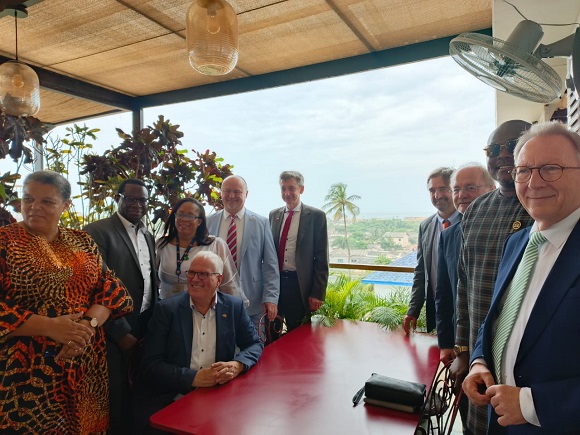A delegation from the German Parliament’s Committee on Development Cooperation has called for increased private sector investments in Ghana, as well as stronger economic collaboration between Ghana and Germany.
The six-member delegation, during their working visit to Ghana, encouraged German investors to explore partnership opportunities in Ghana’s pharmaceutical, Information Technology (I.T), energy sectors, among others.
Dr. Christoph Hoffman, Acting Chairperson of the Committee on Economic Cooperation and Development, who led the delegation, told journalists in Accra on Monday that the Committee would push for a framework to guide investments in Africa.
“We are convinced that giving money alone will not help. This is not enough. You need much more in terms of private investments, which is the solution to everything.
“So, we are also trying if we can leverage our development cooperation to get a framework for a better investment climate in these countries and we also want to see German companies coming to Africa,” he said.
Mr Hoffman said Germany’s Development Cooperation agreement with Ghana was about €700 billion euros, out of which 20 per cent were grants and others in loans, usually through financial cooperation.
The German Parliamentary delegation met with some members of Ghana’s Parliament on Monday to discuss Germany’s development corporation and explore areas for broader collaboration with Ghana.
The delegating also visited the DTRT Apparel Limited in Tema to inspect the Ministry of Development Corporation funded project.
Germany is one of Ghana’s reliable bilateral development partners. Data from the German Embassy in Accra indicate that Germany spends € 100 million per year on projects in Ghana within three major thematic areas- Climate and Energy, Sustainable Economic Development and Good Governance.
Mr Hoffman said Germany had dedicated 0.7 per cent of its GDP annually to international cooperation to support efforts to overcome the economic challenges of the COVID-19 pandemic and the Russia-Ukraine war, especially in Sub-Saharan Africa.
He said the impact of the crisis on Africa had been severe, necessitating Germany’s decision to prioritise the continent in the international cooperation programme.
“Sub-Saharan African is the focus where poverty is still raging. Poverty is the beginning of additional cycle when you have armed conflicts over resources which leads to displacement and you do not come up with solutions, you will have crisis.
“We try to stay as reliable partner. We want to see people out of poverty. We do not want hunger. We want water for everyone” he said.
Mr Volkmar Klein, a Member of the German Parliament, said the energy and agricultural sectors were among the key areas to focus on to strengthen Germany’s relationship with Ghana towards sustainable development.
Sharing his experience with Ghana, he said there was immense potential for manufacturing in Ghana, especially in the agriculture sector, to reduce post-harvest loses and create employment opportunities.
Madam Abla Dzifa Gomashie, the Member of Parliament for Ketu South, said issues of climate change was a major concern and called for collaboration between Germany and Ghana to combat the impact of adverse weather conditions on coastal communities.
“We need holistic discussion on the preservation of our coastline…I hope our conversations with the German delegation will yield something positive,” she said.
GNA





